 What is God’s will for my life? Perhaps God wants me to be a dentist or to start my own Etsy shop or study epidemiology or travel to the ends of the earth and be a missionary. We tend to have the idea that God has some kind of prescription for our life, with our name at the top. It’s a prescription that lays out precisely what I’m supposed to do in this life. And we sometimes spend nearly a lifetime trying to figure out what this prescription is. We call it our calling, our purpose, or God’s will. But it seems to be beyond us, something only God knows, and we have to either wait for God to reveal the prescription or decode the handwriting.
What is God’s will for my life? Perhaps God wants me to be a dentist or to start my own Etsy shop or study epidemiology or travel to the ends of the earth and be a missionary. We tend to have the idea that God has some kind of prescription for our life, with our name at the top. It’s a prescription that lays out precisely what I’m supposed to do in this life. And we sometimes spend nearly a lifetime trying to figure out what this prescription is. We call it our calling, our purpose, or God’s will. But it seems to be beyond us, something only God knows, and we have to either wait for God to reveal the prescription or decode the handwriting.
There is no personalised prescription for you. There is no specific, predetermined “God’s will” for you.
Freedom
God’s will comes in your freedom. Your purpose is exercising that freedom to use your gifts, interests, and talents to contribute to God’s dream for the world. All else would be predestination. See, you have the gift of free will to choose and respond to the life you’ve been given. Ignatius says that our purpose is essentially to serve God’s Project for the world. Some might call it kingdom-building. But you have to discern how to do that, what abilities you have, what your desires are, what possessions you have, and how all of that can contribute to this kingdom-building.
When I imagine a God who has a prescriptive plan for my life then I have a coercive God who doesn’t honour my freedom.
Desire
For many of us, how we contribute to God’s Project changes throughout our life. It might depend on our circumstances, if we’re married, how long we’ve been in a career, if we gain a new interest or skill… And learning a new skill or choosing a career is not because “God is making me” but because we discover within us a desire. God delights whenever we use the things we possess to co-labour with God in the kingdom.
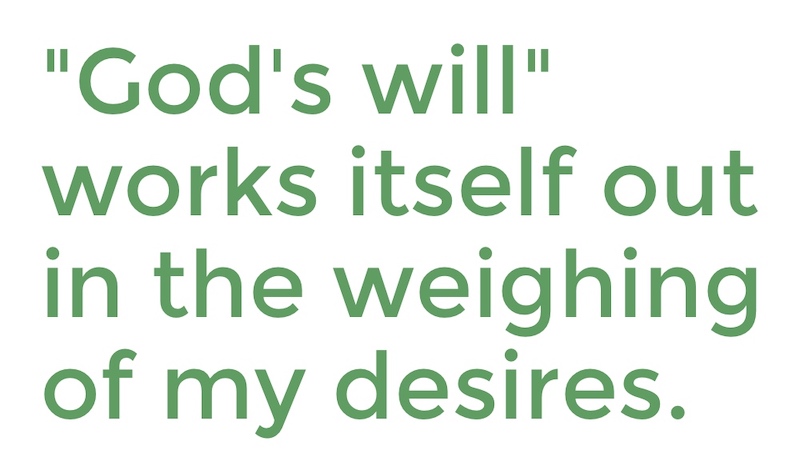 When I was discerning between religious life and marriage I had this realisation that God would delight in either choice. Both were good paths! God would not be “mad” if I chose one over the other. I had to discern for myself what was the better choice for me. “God’s will” works itself out in the weighing of my desires. Ignatius might say that God planted those desires in your heart, and that God shares them. Yes, indeed! Of course God shares in your desires. But this is different than a predetermined, concrete plan. Then you get into the realm of the Adjustment Bureau, where any straying from the Plan for your life requires divine beings to modify things in your life to coax you back into the Plan. It’s a world where free will is just an illusion, where we’re just rigid cogs in a machine.
When I was discerning between religious life and marriage I had this realisation that God would delight in either choice. Both were good paths! God would not be “mad” if I chose one over the other. I had to discern for myself what was the better choice for me. “God’s will” works itself out in the weighing of my desires. Ignatius might say that God planted those desires in your heart, and that God shares them. Yes, indeed! Of course God shares in your desires. But this is different than a predetermined, concrete plan. Then you get into the realm of the Adjustment Bureau, where any straying from the Plan for your life requires divine beings to modify things in your life to coax you back into the Plan. It’s a world where free will is just an illusion, where we’re just rigid cogs in a machine.
The True Plan
The Plan is being in relationship with God and responding to the love of God in a way that aligns your dreams with God’s dreams. St. Paul might call this “living by the the Spirit”. How that plays out specifically is the task of discernment. It requires us to do the hard work of examining ourselves. This is not the kind of discernment where we sit back passively and wait for God’s voice to dictate our life. The dream of God plays out in how we respond to the gifts God has placed in our lives. By asking the question “What is God calling me to?” or “What is God’s will?” we enter into the discernment. We enter into listening to our desires and hopes and dreams and how they might contribute to God’s own larger dream.
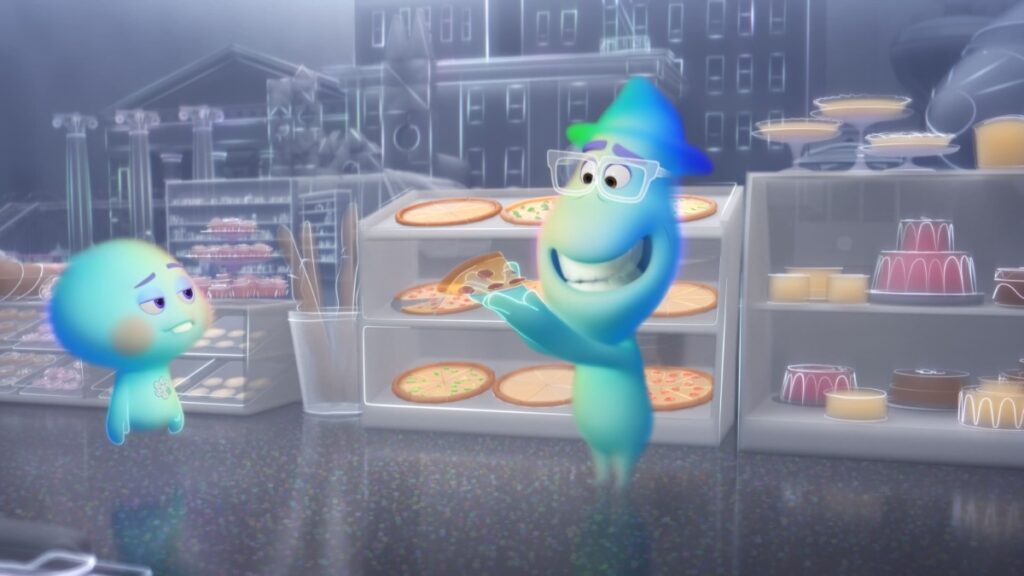 Purpose
Purpose
The Pixar film Soul captures our mentality of specific innate purposes. (Spoilers ahead.) The story follows Joe Gardner, a middle school music teacher who has longed to be a professional jazz musician. Right before a possible big break he falls into a manhole and finds himself dead, in the Great Beyond. But he resists going toward the light and finds himself in the Great Before where brand new souls are formed. Each soul has to “find its spark” before getting a pass to go to earth. They spend time in the Hall of Everything trying out earth things like baking, painting, playing music, being a librarian, putting out fires, or dancing, in order to gain their “spark”. Joe assumes that the spark is one’s purpose. His spark, he thinks, is jazz, what he was born to do. So his whole life is obsessed with this “purpose”. But we discover that your soul’s spark isn’t your purpose. Your spark is simply the joy of being alive. That joy comes through many things: your passions, the beauty of the world, relationships.
But when you conflate a passion with a purpose and become so narrowly focused on that, you can become a lost soul. In the film, these lost souls look like strange and dark cycloptic monsters roaming around aimlessly, in a pit of despair. Their single eye narrows their field of vision on something like career and they miss out on the rest of life. They have built layers upon themselves, layers of false selfhood, obsessions with their careers, with riches, honour, and pride, as Ignatius might say. Their divine essence has essentially been lost. But when they can see with new eyes, and see their false layers, that they’ve been wasting their lives for what they thought was their purpose, they have a resurrection of sorts. Their dark monster outer layers fall away like dust revealing the bright soul beneath. The soul returns to its body and the person gets a new lease on life, a new beginning. Their purpose is not in pursuit of wealth or status, but of love and generosity. They essentially discover that they are worthy in God’s eyes just for who they are, not what they do.
When Joe, who has been mentoring a soul named 22, asks if she’s been assigned her purpose, one of the beings in the Great Before says to him, “We don’t assign purposes. Where did you get that idea?” Her spark, he tries to clarify. “A spark isn’t a soul’s purpose,” the being responds. “Oh you mentors and your passions, your purposes, your meanings of life! So basic…”
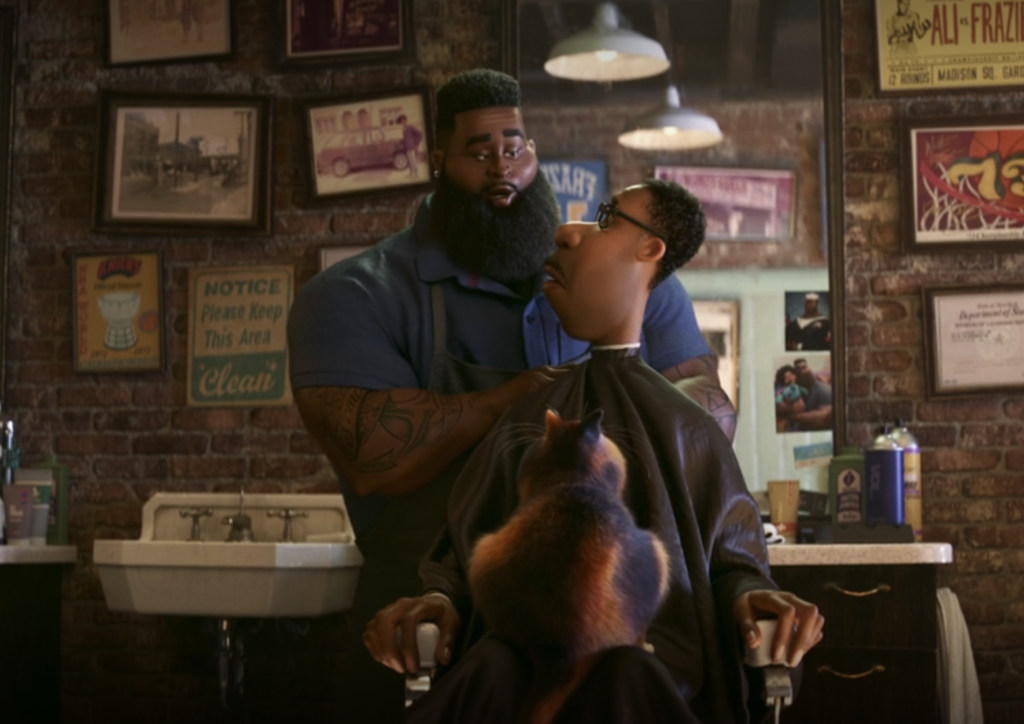 There’s a scene in the movie where Joe (whose body at this point is actually possessed by 22) goes to his barber, Dez, for a haircut. As they converse about purpose, we find out that Dez didn’t always want to cut hair. He wasn’t “born to do it” as 22 assumed. He wanted to be a veterinarian, but barber school was a lot less expensive. 22 assumed he was “stuck” in this job, but Dez said no. What he loves about being a barber is that he gets to meet interesting people and make them happy.
There’s a scene in the movie where Joe (whose body at this point is actually possessed by 22) goes to his barber, Dez, for a haircut. As they converse about purpose, we find out that Dez didn’t always want to cut hair. He wasn’t “born to do it” as 22 assumed. He wanted to be a veterinarian, but barber school was a lot less expensive. 22 assumed he was “stuck” in this job, but Dez said no. What he loves about being a barber is that he gets to meet interesting people and make them happy.
Joe realises that his passion for jazz is a simply a passion. His purpose in life is so much bigger: to relish life’s joys and gifts. Ignatian spirituality’s principle of finding God in all things is all about appreciating the gifts God has placed in our lives, whether it’s a passion, a career, a hobby, a relationship, a possession, or a moment of beauty. Our purpose comes in our freedom to respond to those gifts given out of love. When we truly respond with our whole selves, our deep desires, and all that we bring into this world, then we are doing God’s will. We listen not for the voice of a dictator but of a friend, a collaborator who is with us on the journey of our self-discovery. There’s companionship.
When we know our heart’s capacity to love and what we’re good at we can begin to make decisions that flow naturally into God’s dream to transform and unify the world in love. There are no more attempts to decode a cryptic prescription that never existed in the first place. You are God’s will. Live that out and be who you are.
Related posts:
Listen to the podcast version of this post…



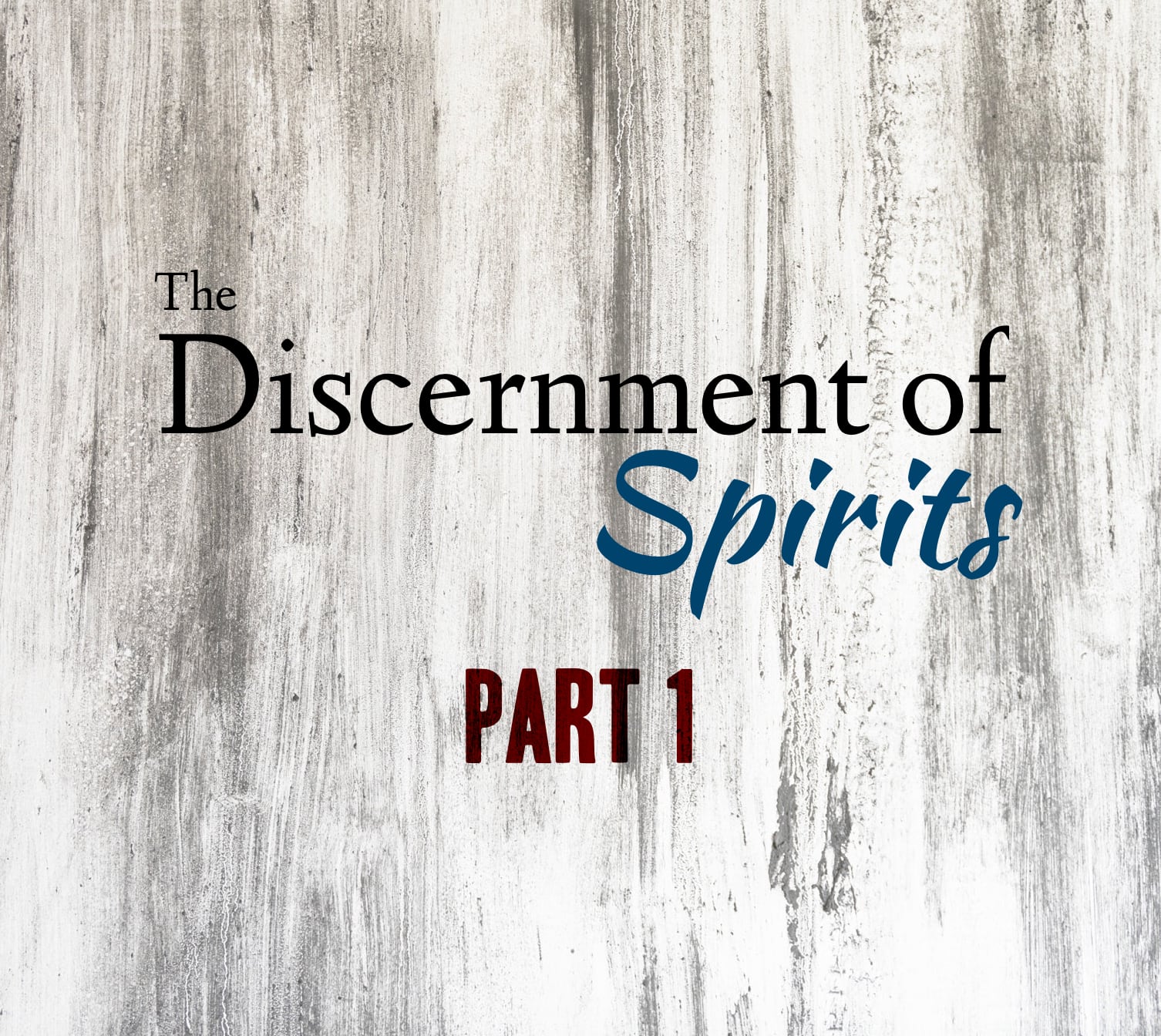

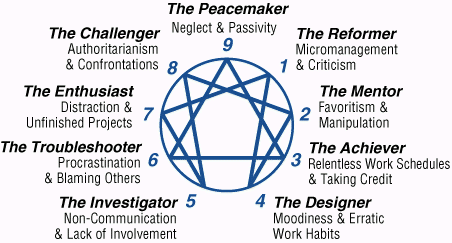



Wonderful reflection! I want to watch Soul with our grandchildren😊
Thank you for this wonderful reflection, Andy! As a Presbyterian who has had a love-hate relationship with Predestination, these words speak to my heart. Thank you!
What a great meditation! I wasn’t going to watch Soul but I will now! As a Protestant we are known for ‘seeking God’s will for our lives’ as if it IS the Holy Grail but this puts things into a perspective for me that makes far more sense – God Bless You!
That’s really beautiful. I will re-read again and again to make sure I am getting it all. Thanks alot. Anne